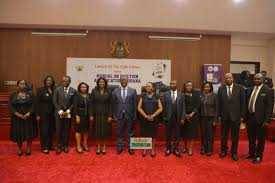CJ Launches Elections and Judiciary Manual: A Step Towards Enhanced Electoral Integrity
In a landmark event aimed at bolstering electoral integrity and judicial efficiency, the Chief Justice (CJ) of Ghana recently launched the "Elections and Judiciary Manual," a comprehensive guide designed to streamline the electoral process and enhance the judiciary's role in elections. This initiative reflects a commitment to transparency, fairness, and accountability within the electoral system, addressing longstanding concerns over electoral disputes and judicial interventions.
Background
Ghana's democratic journey has been marked by a series of electoral challenges, including disputes over results, allegations of electoral fraud, and the role of the judiciary in resolving such issues. The need for a well-defined framework that guides the interaction between the electoral commission and the judiciary has become increasingly evident. Recognizing this gap, the CJ has taken the initiative to develop a manual that not only clarifies procedures but also establishes best practices for handling electoral matters.
Objectives of the Manual
The "Elections and Judiciary Manual" aims to achieve several key objectives:
1. **Enhancing Electoral Integrity**: By providing clear guidelines on the judicial processes related to elections, the manual seeks to ensure that all electoral disputes are handled with utmost integrity and fairness. This is crucial in maintaining public trust in the electoral process.
2. **Streamlining Judicial Procedures**: The manual outlines standardized procedures for addressing electoral complaints and disputes. This will help reduce the time taken to resolve cases, ensuring that justice is served promptly and efficiently.
3. **Facilitating Training and Capacity Building**: The manual serves as a resource for training judges and judicial staff on the intricacies of election law and the judicial processes involved in electoral disputes. This capacity-building initiative is essential for ensuring that the judiciary is well-equipped to handle electoral matters competently.
4. **Promoting Collaboration**: The manual encourages collaboration between the Electoral Commission (EC) and the judiciary. By outlining the roles and responsibilities of each entity, it aims to foster a cooperative environment that enhances the overall electoral process.
Key Features of the Manual
The manual is structured to provide comprehensive coverage of various aspects of the electoral process. Key features include:
- **Detailed Procedures**: It outlines the steps to be followed in the event of electoral disputes, including timelines for filing complaints and the processes for hearings.
- **Judicial Principles**: The manual emphasizes the principles of fairness, transparency, and accountability that should guide judicial decisions in electoral matters.
- **Case Studies**: It includes case studies from previous elections, illustrating how disputes were handled and providing insights into best practices.
- **Stakeholder Roles**: The manual clarifies the roles of various stakeholders, including political parties, electoral observers, and civil society organizations, in the electoral process.
Implications for Future Elections
The launch of the "Elections and Judiciary Manual" is expected to have significant implications for future elections in Ghana. With a clear framework in place, stakeholders can better navigate the complexities of electoral disputes. This is particularly important as Ghana prepares for the upcoming 2024 general elections, where the stakes are high, and the need for a credible electoral process is paramount.
Moreover, the manual is likely to enhance public confidence in the electoral system. When citizens see that there are established procedures for addressing grievances and that the judiciary is prepared to uphold electoral integrity, their trust in the democratic process is likely to increase.
Conclusion
The Chief Justice's launch of the "Elections and Judiciary Manual" represents a proactive step towards ensuring that Ghana's electoral processes are conducted with the highest standards of integrity and efficiency. By providing clear guidelines and promoting collaboration between the judiciary and the Electoral Commission, this initiative aims to foster a more transparent and accountable electoral environment. As Ghana approaches the 2024 elections, the successful implementation of this manual will be critical in upholding the democratic ideals that the nation strives to achieve.




No comments yet
Be the first to share your thoughts!